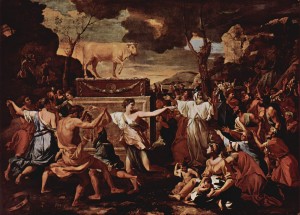Ki Tisah (Exodus 30-34)

Nicolas Poussin
“Hurry down,” are God words to Moses right after the Israelites’ drunken dance around the Golden Calf right there at the Mountain of God. Moses is still on the Mountain and has no idea of what the Israelites are up to. In God’s words to Moses as well as in Moses’ response, the word people, in Hebrew am, is repeated time and again: “Your people,” “This people,” “his people,” and the phrase, “ a stiffnecked people” which is mentioned here for first time.
The question is, whose people is “this people”, “your people/his people” and this “stubborn people”? How did the Israelites become Moses’people?
The verses describing God’s reaction to the people, “the stubborn/stiffnecked people” reflect the moment that the Israelites are engaged in abandoning God and at that betraying moment they become Moses’s nation, “Your people” God says to Moses, “that you delivered from the land of Egypt,”—not “My people,” that “I brought out of Egypt” (20:2).
God’s distancing from the nation is at that juncture that the people turned corrupt and abandoned God’s mitzvot – the first Commandment that prohibits the making and worship of other gods, the very first mitzvah that the people took on at Sinai.
Worshiping other gods took place in Moses’ absence, when the people made a mold of a Golden Calf, and declared “these are the gods of Israel who delivered you from the land of Egypt.” This betraying act elicits God’s tough response and he says to Moses, ”No let Me be, that My anger may blaze against them and that I may destroy them.”
Moses responds immediately on the behalf of the people showing himself a true leader as he pleads with God asking God to alter the decision. Moses pleads in a prayerful way and recalls the historic special relationship between God and his people, now severely tested. “Let not your anger God consume the people that You have delivered from the Land of Egypt.” Moses in his plea transfers the people back to God, the nation that “You delivered from Egypt with great power and a mighty arm.” Moses draws on near history- the exodus (“Let not the Egyptians say”) and invokes the early history—the birth of the relationship: God’s promise to the forefathers “to Abraham, Isaac and Yisrael, Your servants,” invoking the name Israel and not Jacob as a forefather to underscore that the promise includes peoplehood, not just the forefathers. In the appeal to God, Moses creates a direct and immediate link between the transgressing Israelites and the covenantal forefathers, the covenant that Moses emphasizes on which Rabbi Hirsh comments: “God knew at the time He promised the forefathers that the binding covenant would never abandon the people, and in any case the people will not lose the capacity to return and be deserving of it; otherwise there would not have been much sense in God giving a covenant promise under oath to the forefathers, that their descendants will be God’s people on the earth and forever.”
Moses prayer was successful, God responded by cancelling the angry plan; God restored “that people” and “the stubborn people” to its previous state of God’s people. “God renounced the punishment He had planned to bring on His people.”